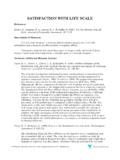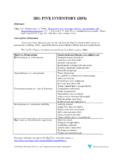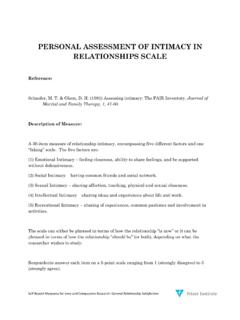Transcription of DYADIC ADJUSTMENT SCALE (DAS) - Fetzer Institute
1 Self Report Measures for Love and Compassion Research: General Relationship satisfaction DYADIC ADJUSTMENT SCALE (DAS) Reference: Spanier, G. B. (1976). Measuring DYADIC ADJUSTMENT : New scales for assessing the quality of marriage and similar dyads. Journal of Marriage and the Family, 38, 15 28. Description of Measure: A 32-item measure of relationship quality. The SCALE is divided into 4 subscales: (1) DYADIC Consensus degree to which respondent agrees with partner (2) DYADIC satisfaction -- degree to which respondent feels satisfied with partner (3) DYADIC Cohesion degree to which respondent and partner participate in activities together (4) Affectional Expression degree to which respondent agrees with partner regarding emotional affection.
2 Items have varying response scales (see SCALE below). Abstracts of Selected Related Articles: Graham, J. M., Liu, Y. J., & Jeziorski, J. L. (2006). The DYADIC ADJUSTMENT SCALE : A reliability generalization meta-analysis. Journal of Marriage and Family, 68, 701-717. We conducted a reliability generalization meta-analysis to examine the internal consistency of DYADIC ADJUSTMENT SCALE (DAS; Spanier, 1976) scores across 91 published studies with 128 samples and 25,035 participants. The DAS was found to produce total and DYADIC cohesion, Consensus, and satisfaction scores of acceptable internal consistency, although lower than those originally reported by Spanier (1976).
3 Reliability estimates of these scores did not differ by the sexual orientation, gender, marital status, or ethnicity of the sample. The Affective Expression subscale was found to produce scores with poor Cronbach's alpha across studies. Reliability estimates of Affective Expression scores were highly influenced by sample characteristics. The implications of these results are discussed as they relate to the use of the DAS in research. Carey, M. P., Spector, I. P., Lantinga, L. J., & Krauss, D. J. (1993). Reliability of the DYADIC ADJUSTMENT SCALE .
4 Psychological Assessment, 5, 238-240. Self Report Measures for Love and Compassion Research: General Relationship satisfaction This study examined the reliability of Spanier's (1976) DYADIC ADJUSTMENT SCALE (DAS). Middleaged men and women (/V = 158) completed the DAS on 2 occasions separated by approximately 2 weeks. Separate alpha and stability coefficients were calculated for each of the 4 DAS subscales as well as the Total score. Coefficients alpha ranged from .70 (for the 4-item Affectional Expression subscale) to .95 (for the 32-item Total score), Mdn =.
5 87. Stability coefficients ranged from .75 (Affectional Expression) to .87 (Total), Mdn = .81. Partial correlations revealed that the stability of the DAS was not influenced by subjects' age, educational attainment, number of children, relationship duration, or the length of the test-retest interval. These results suggest the DAS and its 4 subscales are internally consistent and stable over the interval examined in this study. Spanier, G. B. & Thompson, L. (1982). A confirmatory factor analysis of the DYADIC ADJUSTMENT SCALE . Journal of Marriage and Family, 44, 731-738.
6 Evaluated the DYADIC ADJUSTMENT SCALE by reconsidering the factor structure of the SCALE and its subscales using a maximum likelihood, confirmatory factor-analysis procedure. Studied a new sample from the same geographical area. High reliability was confirmed for the overall SCALE . SCALE : Contact Multi Health Systems 1-800-456-3003 for permission to use items. Self Report Measures for Love and Compassion Research: General Relationship satisfaction REVISED DYADIC ADJUSTMENT SCALE (RDAS) Reference: Busby, D. M., Christensen, C.
7 , Crane, D. R., & Larson, J. H. (1995). A revision of the DYADIC ADJUSTMENT SCALE for use with distressed and nondistressed couples: Construct hierarchy and multidimensional scales. Journal of Marital and Family Therapy, 21, 289-308. Description of Measure: A 14-item SCALE designed to measure relationship satisfaction . The RDAS is a revised version of the original DYADIC ADJUSTMENT SCALE (Spanier, 1976 see this website for information on the original). The revised version offers improved psychometric properties, is shorter, and includes only 3 of the original 4 subscales: (1) DYADIC Consensus degree to which respondent agrees with partner (2) DYADIC satisfaction -- degree to which respondent feels satisfied with partner (3) DYADIC Cohesion degree to which respondent and partner participate in activities together The items have varying response scales (see SCALE below).
8 Abstracts of Selected Related Articles: Spanier, G. B. (1976). Measuring DYADIC ADJUSTMENT : New scales for assessing the quality of marriage and similar dyads. Journal of Marriage and the Family, 38, 15 28. This study reports on the development of the DYADIC ADJUSTMENT SCALE , a new measure for assessing the quality of marriage and other similar dyads. This factor analytic study suggests four empirically verified components of DYADIC ADJUSTMENT to Self Report Measures for Love and Compassion Research: General Relationship satisfaction be used as subscales ( DYADIC satisfaction , DYADIC cohesion, DYADIC consensus and affectional expression).
9 Treboux, D., Crowell, J. A., & Waters, E. (2004). When new meets old : Configurations of adult attachment representations and their implications for marital functioning. Developmental Psychology, 40 295-314. Two studies addressed the implications of concordance versus discrepancy of attachment representations in individuals at 2 stages in their marital relationships. Engaged (n _ 157) and dating (n _ 101) couples participated in a multimethod 6-year longitudinal study of adult attachment. Individuals completed the Adult Attachment Interview (AAI), the Current Relationship Interview (CRI), and various questionnaires and were observed in interactions with partners.
10 On the basis of AAI and CRI classifications, participants were placed in one of four groups: SecureAAI/SecureCRI, SecureAAI/InsecureCRI, InsecureAAI/SecureCRI, or InsecureAAI/InsecureCRI. Each of the configurations showed a particular pattern of behavior, feelings about relationships and the self, and likelihood of relationship breakup. The findings of the studies address important points about the protective effects of attachment security and have interesting implications for the extension of attachment theory into adulthood. Graham, J.










